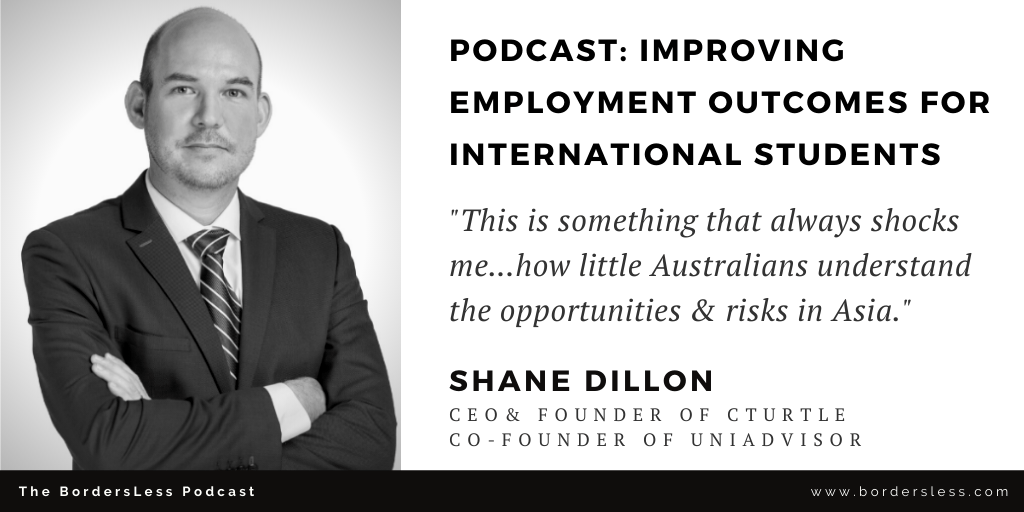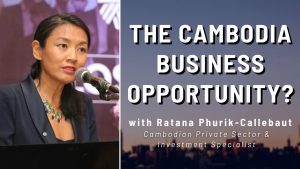Shane Dillon (Cturtle): Helping International Students Find Jobs
Data shows that 95% of international students will return to their home country within 3 years of graduating. Additionally, these students will struggle to find well-paying jobs due to the lack of professional networks, compared to their peers that stayed.
After realising that Australian universities provided very little employment support to international students, Shane Dillon (CEO of Cturtle) spotted an opportunity to assist these dissatisfied students to find jobs when they return to their home countries.
It’s become clear that these universities have been overpromising and under-delivering when it comes to the realities of studying and finding work in Australia. Coupled with paying exorbitant student fees, this presents a reputation risk to the education sector, which is Australia’s 3rd largest export.
Key Episode Themes:
- Lack of university engagement & support for international students.
- Poor employment outcomes abroad and at home as an international student.
- The lack of understanding of Asia by Australian businesses & academic leaders.
- The potential impacts of COVID-19.
- Vietnam as a destination for founders & startups.
About Cturtle & Shane Dillon
Originally from Brisbane, Australia, Shane founded Cturtle, an edtech data company and employment network for international graduates in 2016. It is a talent community for companies looking to connect with local candidates who are bi-lingual, cross-cultural and educated at top universities in Australia, UK, USA, Canada, Europe and New Zealand.
“Sea Turtle” is an affectionate name given to international graduates who return to their home countries after studying abroad in Australia, UK, USA, Canada & New Zealand. It’s a term commonly used in China (海归) for students that returned to the mainland after studying abroad. In the past, these students were highly sought after in the job market due to their international experiences but now face increased competition from their highly educated peers at home.
With a network of over 1.3 million international alumni who have returned to ASEAN, Greater China and South Asia, Cturtle works with innovative universities to connect their international graduates with over 12,000 hiring managers across Asia.
To find out more, please visit https://cturtle.co/ or feel free to add Shane on LinkedIn.
Additionally, Shane is the co-founder of UniAdvisor, a ranking platform for universities around the world based on reviews, experience and employment data from thousands of international graduates. For more info, check out https://www.uniadvisor.co/.
Episode Quotes
The Dissatisfaction of International Graduates
- Maybe 95% of international students who studied in Australia will end up back home within 3 years of graduation. There’s very little done to support those graduates.
- There’s a lot of marketing and messaging around how studying in Australia would help your career, but very little support in actually delivering that promise. So we were overwhelmed by the demand from students and graduates.
- Our research shows that only 40% actively promote Australia as a study destination & actively promote their university to future students. Most of that dissatisfaction comes from employment support while they’re in Australia. They are looking for that return on investment.
- More alarmingly over 20% of students actively don’t recommend their university or their experiences to future students.
- There is a lack of understanding within employers in Australia about post-study work rights.
- For graduates that do return, their main issue is their lack of professional network back home.
- Those that studied at an international campus at home earned significantly more money upon graduating. For example, if you stayed in Vietnam and went to RMIT, do you earn more than if you went to RMIT in Melbourne? The answer is yes… and most of it is because you’ve maintained that professional network.
Impact of COVID-19
- This is what the higher education sector needed in terms of a radical change in the ways they operate. You’ve seen this with the adaption of online learning, which some universities have been against for a long time. But then suddenly they can all do it in 2 months if they really have to.
- It’s a time where students are seeking more value due to the economic and job uncertainties.
- Universities that can prove with data the employment outcomes of their students, they’re the ones that will come out as winners in terms of attracting more international students
Lack of Asia understanding in Australia
- It always shocks me how little Australians understand Asia, the opportunities & risks, especially from a corporate & academic perspective.
- There’s a lack of Asia capable leaders in Australia. There’s so much opportunity in Asia but there just seems to be very very little Australian business involvement.
- Australia doesn’t seem to plan for the future. It only seems to react to the present.
- With Vietnam, you have the backdrop of this phenomenal economic growth. So you’ve got a young population, the economy is doing well, it creates a real buzz atmosphere….that everyone is doing better off than their parents were, and that’s not really true anymore of Western countries.
- It’s an amazing economy, the people are unbelievably friendly, it’s got a great quality of life…I’ve been here for almost 12 years.
Timestamps
0:37 – Introduction to Cturtle & Shane Dillon
1:11 – Inspiration for starting Cturtle
2:17 – Why did you base yourself in Vietnam?
3:00 – Lack of support from Australian universities in regard to international alumni.
4:40 – Why have the universities been so poor in regards to this?
6:30 – International students’ opinions of Australia as a destination for study.
7:40 – How does Australia compare to alternative education markets?
8:30 – What are the major employment barriers for students staying in Australia or returning home?
10:35 – How much data do you collect? What data do you collect?
12:05 – Potential Impact of COVID-19.
14:00 – Thoughts on the over-reliance of international students by Australian universities.
15:00 – Thoughts on the treatment of these students. Are they treated like cash cows?
16:15 – What can Australia universities do better?
18:05 – Lack of Asia understanding by Australians.
20:45 – Next economic opportunities for Australia: ASEAN.
21:50 – Australian brain drain, lack of long-term planning.
23:05 – How does Australia rank compared to other markets?
24:30 – Why do international students get paid less than their counterparts that stayed at home?
26:00 – If that’s the case, why do these students study abroad?
27:10 – Thoughts on Aussies studying and living abroad.
28:35 – Thoughts on entrepreneurship in Vietnam and SE Asia.
34:00 – Current status of Cturtle & UniAdvisor.
35:15 – what do international students typically study?
35:50 – Interesting statistics.
37:15 – Thoughts on international student agents / recruiters.
40:30 – Increased competition from other universities.
41:20 – Australia should see students as assets rather than cash cows.
41:50 – How to contact Shane or find out more about Cturtle, final thoughts.


